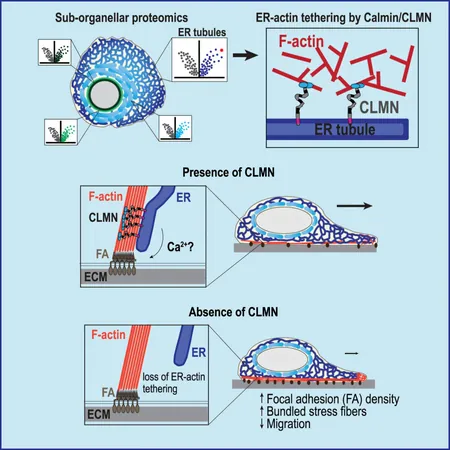
Breakthrough Discovery: Protein Linked to Cancer Cell Movement Unveiled!
2025-04-10
Author: Wei Ling
Revolutionary Research Sheds Light on Cancer Metastasis
Groundbreaking research from UT Southwestern Medical Center has unveiled a crucial protein that could change the game in understanding cancer cell movement and metastasis. Their new method, featured in *Cell Reports*, offers insights into how cells organize themselves and could lead to advances in cancer treatment.
Meet Calmin: The Unsung Hero of Cell Movement
Led by Dr. W. Mike Henne, along with postdoctoral researcher Holly Merta, the team delved into the mysterious world of the endoplasmic reticulum (ER)—a vital organelle responsible for numerous cellular tasks. Their innovative approach, dubbed sub-organelle spatial proteomics, allowed them to pinpoint the location and function of calmin, a previously under-explored protein.
How They Did It: CRISPR Meets TurboID
Utilizing cutting-edge technology, they combined CRISPR gene editing with TurboID, an enzyme that pins chemical tags on nearby proteins. This strategic tagging enabled the researchers to create a detailed 'map' of proteins within the ER, revealing surprising findings.
Calmin Revealed: A Key Player in Cell Adhesion
Upon investigation, calmin was found to bind with F-actin, a critical component of the cytoskeleton that plays a pivotal role in cell shape, movement, and attachment. Depleting calmin in moving cells resulted in slower movements and the formation of more focal adhesions, whereas overproducing calmin led to the opposite effect. This suggests that calmin is essential in modulating the dynamics of focal adhesions, allowing cancer cells to adapt and survive in new environments.
Implications for Cancer Research: A Potential Game-Changer
Given that calmin is frequently mutated in various cancers, this protein could be instrumental in understanding and potentially controlling cancer metastasis. By enhancing focal adhesions, metastatic cells might more effectively establish secondary tumors, paving the way for advanced therapeutic strategies.
Beyond Cancer: Calmin’s Role in Neurons
Interestingly, calmin is also implicated in the development of neurons, suggesting its role extends beyond cancer. Researchers are eager to explore its functions in cellular growth and development in future studies.
This breakthrough not only enhances our comprehension of cancer biology but also may lead to innovative strategies for targeting metastasis, potentially saving lives in the fight against cancer!



 Brasil (PT)
Brasil (PT)
 Canada (EN)
Canada (EN)
 Chile (ES)
Chile (ES)
 Česko (CS)
Česko (CS)
 대한민국 (KO)
대한민국 (KO)
 España (ES)
España (ES)
 France (FR)
France (FR)
 Hong Kong (EN)
Hong Kong (EN)
 Italia (IT)
Italia (IT)
 日本 (JA)
日本 (JA)
 Magyarország (HU)
Magyarország (HU)
 Norge (NO)
Norge (NO)
 Polska (PL)
Polska (PL)
 Schweiz (DE)
Schweiz (DE)
 Singapore (EN)
Singapore (EN)
 Sverige (SV)
Sverige (SV)
 Suomi (FI)
Suomi (FI)
 Türkiye (TR)
Türkiye (TR)
 الإمارات العربية المتحدة (AR)
الإمارات العربية المتحدة (AR)